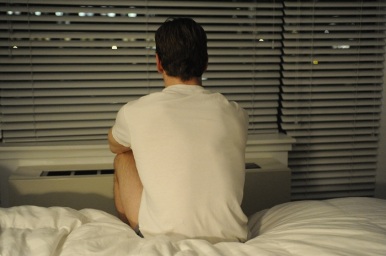(This piece contains “spoilers.”)
The critical response to SHAME has been slightly baffling to me. The movie has a brave performance by Michael Fassbender and a couple of scenes that feel remarkably true (Brandon’s attempt at a real date is the movie’s most insightful moment), but the film also displays a clumsy misunderstanding of its subject that can’t be ignored. That particular discussion seems to have been disregarded in exchange for an embarrassingly wide pre-occupation with Fassbender’s sexiness — a weird thing to walk away from SHAME talking about, to be sure. It’s the equivalent of fixating on Jennifer Connelly’s degrading dildo scene in REQUIEM FOR A DREAM over its harrowing themes of addiction. Yeah, it’s sexual, but it’s not supposed to be sexy, guys.
SHAME hit its first truly sour note with me during a lingering shot of Brandon viewing his distorted reflection on the side of a bus. The shot is a cliched visual shorthand that says “On the inside, this person is not who they appear to be.” It’s the kind of weak somebody-already-thought-of-that trick that most filmmakers leave behind at film school. But, it’s in here, and it sucks — not enough to ruin the movie, but enough to act as a warning for what’s to come.
After an extended orgy (shot with the inappropriately titillating gusto of an episode of HBO’s REAL SEX), Brandon ends up trolling for sex at a gay club (shot like a horror film). The implications are ambiguous; we don’t know if this is something Brandon has done before or not. It shouldn’t really matter, since all of Brandon’s sex is an empty experience, sexual orientation is irrelevant, but in director Steve McQueen’s eyes this homosexual act is the end-all-be-all of sexual lows. It’s the scariest thing a (homophobic) straight male can think of — finding themselves so horny that they might let another dude touch them. Just conceptually, it’s an offensive way to portray a sex addict’s low point.
McQueen, who also wrote SHAME, flounders with this. It’s not dramatic enough to get Brandon to rock bottom, and he knows it’s not enough, but McQueen doesn’t understand why. So, he has Brandon come home after some anonymous gay sex to discover that his sister has attempted suicide in his own apartment. Besides the hilariously puritanical message (“While you were out getting your rocks off, your sister almost DIED!”), Brandon’s rock bottom is now his sister’s rock bottom. Brandon hits no rock bottom of his own, but the film would have you believe that this is it.
The attempted suicide has some shock value, but it’s also something that student filmmakers have a preoccupation with, because it’s an easy cinematic go-to to show that a personal situation is in dire shape. McQueen makes the mistake of tying Brandon to this moment as if it somehow would make him less compulsive and horny, and suddenly ready to love and commit. Though his sister is alive, he has a wailing catharsis on a pier, spurred on partly because he’d been incredibly crappy to her and partly because he was having empty sex while she bled out.
I’m still not sure how her personal rock bottom translates into being his rock bottom. Her suicide is something that could’ve happened if Brandon were attending church or out grocery shopping; it has nothing to do with his addiction to sex. Her lowest point can’t be his lowest point, because it’s happening only to her, and it’s happening to her in a way that he doesn’t have any empathy for. Do I believe that Brandon would be sad that his sister almost died? Yes. Do I believe this event is a turning point in his life? Not one bit.
A more satisfying ending would’ve taken more work from McQueen, getting to Brandon’s emotionally darkest place and exposing him in such a wholly naked, vulnerable way that he has no choice but to change. Instead SHAME goes easy, with a finale that makes the whole film inauthentic and immature. It’s a damned SHAME.

